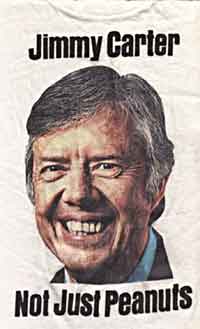58b. The Sickened Economy

Jimmy Carter used his "common man" image to defeat Gerald Ford and capture the White House in 1976. This campaign shirt assures voters that there is more to Carter than just his previous job as a peanut farmer.
Malaise Noun. 1) An indefinite feeling of debility or lack of health. 2) A vague sense of mental or moral ill-being.
People can feel malaise. Nations can feel malaise. Economies can feel malaise. In the mid-1970s much of America suffered a collective malaise.
Nothing fuels a strong case of malaise like a sputtering economy. The United States had grown accustomed to steady economic growth since the end of World War II. Recessions were short and were followed by robust economic growth. For the first time since the Great Depression, Americans faced an economy that could result in a lower standard of living for their children.
Inflation, which crept along at one to three percent for the previous two decades, exploded into double digits. Full employment, defined as unemployment rates of five percent or less, had been achieved in most years since 1945. Now the unemployment rate was nearing the dangerous ten percent line. Americans asked the question: what went wrong?

Gerald Ford hoped to curb the inflation rate with his "Whip Inflation Now!" or "WIN" campaign of 1974. Despite this effort, inflation continued to rise throughout the 1970s.
Economists had long held that inflation and unemployment were polar forces. High inflation meant a great deal of spending; therefore, many jobs would be created. Unemployment created jobless Americans with less money to spend; therefore, prices would stay the same or fall. Surprisingly, the United States experienced high unemployment and high inflation simultaneously in the 1970s — a phenomenon called stagflation. Experts and commoners debated the roots of this problem with differing opinions.
One possibility was the price of oil. When Israel defeated its Arab neighbors in the Yom Kippur War of 1973, Arab oil producers retaliated against Israel's allies by leading the Organization of Petroleum Exporting Countries (OPEC) to enact an embargo. Oil prices skyrocketed immediately in the United States as the demand outstripped the supply. Automobiles and drivers sat in long gas lines at service stations.
The price of oil is independent of other factors such as falling worker productivity and foreign competition, which led to greater unemployment. Oil prices also influence the prices of all consumer goods. Products that require oil to produce would now cost more. Any commodity shipped by truck or airplane would pass its new expenses off to the consumer. As the decade progressed, the embargo was lifted, but OPEC steadily raised prices each year. The price of a gallon of gasoline more than tripled from the 1970 to 1980.
Richard Nixon tried to fight inflation first by cutting government spending, but ultimately by imposing wage and price controls on the entire nation. Gerald Ford watched the inflation rate soar above 11 percent in 1974. He enacted a huge propaganda campaign called Whip Inflation Now (WIN), which asked Americans to voluntarily control spending, wage demands, and price increases. The economy, along with Watergate disillusionment, led Ford to suffer defeat at the hands of Jimmy Carter in the 1976 Presidential election.

The Organization of the Petroleum Exporting Countries — or OPEC — consists of 11 member nations that currently supply more than 40% of the world's oil. Seen here are representatives of the member nations in 1999.
Carter tried tax and spending cuts, but the annual inflation rate topped 18 percent under his watch in the summer of 1980. At the same time, the unemployment rate fluctuated between 6 and 8 percent. Economic woes may well have been the decisive factor in Carter's defeat to Ronald Reagan in the election of 1980.






